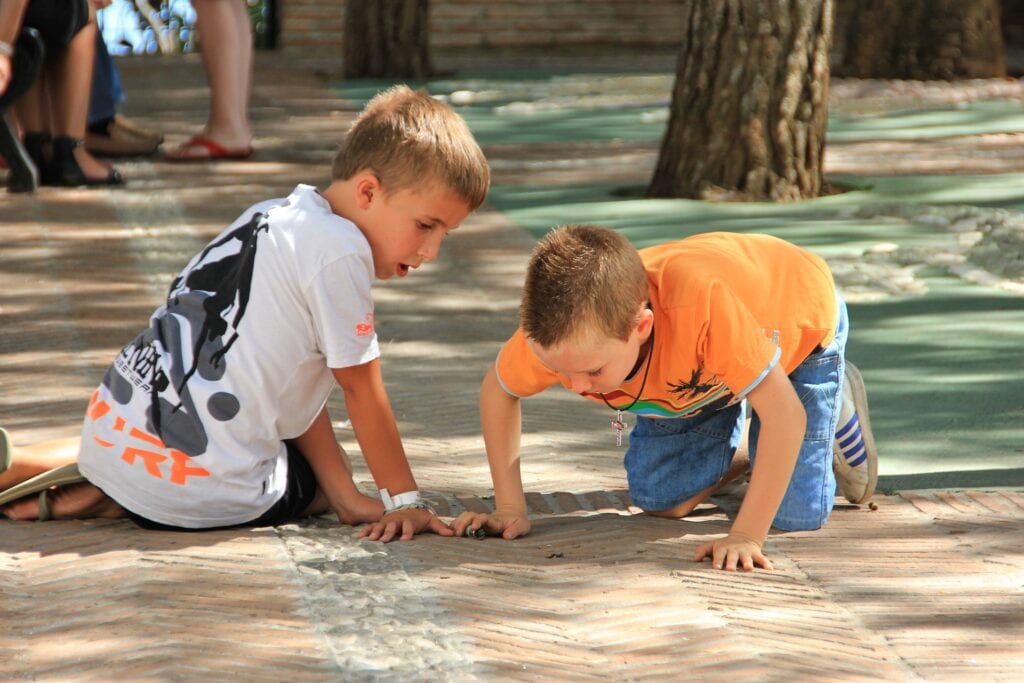There are many benefits and challenges that come along with living the digital nomad lifestyle. This can feel especially true when you have a family, especially a family that includes school-aged children.
We’ve talked about family life as a digital nomad before, the good, the bad, and the ugly. You can read the complete article here.
Today, we are talking about schooling and how you can support your child’s education while on the road. We are going to look principally at worldschooling, as this is an opportunity that digital nomad kids have that many others miss out on.
We are going to look at exactly what worldschooling is, how it fits in alongside other types of schooling, the key benefits of worldschooling, and answer a few burning questions that many people have about educating their children outside of the traditional classroom.
Digital Nomad Kids
There are a variety of ways that school-aged children end up living the digital nomad lifestyle.
They could be born to digital nomads and grow up within that philosophy and environment, or a parent could decide to become a digital nomad and to take their children with them.
In contrast, some parents actively choose the digital nomad lifestyle when their kids get to a certain age to deliberately give their kids a different kind of lifestyle and education. Some choose to do this just for a year or two to differentiate and enrich their children’s education, while others choose to do it in the long term.
Depending on the values of the family, how long they are going to be traveling for, where they will be traveling, and the age and temperament of the child, parents tend to choose a variety of different approaches to education.
Let’s take a look at some of them.

Educating a Digital Nomad Child
We have already mentioned the term “worldschooling”, which is generally used to refer to an approach when you turn your back on the formal education system and choose to teach your children through travel.
But what exactly this looks like in practice varies significantly. Let’s take a look at the most common approaches, though it is fair to say that most digital nomads use a combination of these.
Local Schools
Some parents choose to enrol their children in local schools. This usually works best when schools have comparable curriculums so that kids will have about the right knowledge level to jump in and participate. For example, the United States, Australia, and Europe tend to share similarities in curriculum levels.
Parents often choose this option when they are in one place for an extended period, so it is convenient and gives children an opportunity to make friends. Parents will also choose this if they want to give their kids the opportunity to immerse themselves in the local language and learn it more quickly.
Home Schooling
Other parents choose to home school. This basically means that they are following the curriculum of their home (or chosen) country, but instead of sending their kids to school, they teach them the lessons at home.
Many parents choose to home school even when they aren’t travelling. Children are then prepared to sit national tests, such as GCSEs in the United Kingdom.
Digital nomad parents will often choose this option when their kids are already accustomed to attending traditional school and are one of those children that thrive in a structured learning environment, or when their children will only be out of school for a specific period. Sticking to the curriculum makes it easier for them to reintegrate into school alongside the same friends and classmates when they return.
Many worldschoolers would argue that this is not technically a form of worldschooling as it is still tied to a formal school curriculum. But many digital nomads choose to home school their children, at least in part, alongside other approaches to learning.

Unschooling
Some parents choose to forego any specific curriculum or educational goals for their children and instead let their children’s learning evolve naturally based on their interests and curiosity. As children need help with certain tasks or show interest in certain topics, parents help to guide the learning process.
So, for example, children learn basic skills such as reading, writing, and mathematics by completing everyday tasks. They are then left to pursue their own interests without any kind of formal learning environment, which they are encouraged in. If they develop a fascination with bugs, their parents might help them to dive deeper into the topic of entomology. If they find themselves intrigued by old buildings and local history, parents can help kids to learn more about history.
As part of this process, the children also learn how to learn. They learn how to ask questions, follow their curiosity, and discover what they don’t already know.
Many parents find that with this type of schooling, children are more motivated and inspired by the things that they are learning. However, it can lead to “gaps” in their knowledge as certain subjects common to the school curriculum aren’t covered. Whether that is important or not is a matter of opinion.
There is also a strand of unschooling called Radical Unschooling, which completely removes any barriers between educational and non-educational activities. Children are also encouraged to make all of their own decisions, with minimal guidance and orientation from their parents.
Worldschooling
Worldschooling is generally considered a form of unschooling, except that travel is the backdrop for children’s learning experiences.
As well as dealing with the logistics of travel, they learn through meeting new people, encountering new cultures, and visiting inspiring places. Many believe that this leads to a richer experience for kids than they would get from unschooling while staying in one place.
You could imagine your child developing a fascination for linguistics as they are intrigued by how people of different cultures communicate. You can imagine them becoming history fanatics as they visit important sights that tell compelling stories. You can even see them becoming interested in computer programming as they see how in some countries individuals can run entire businesses from a mobile phone, and also start to think of ways to improve how things work.

![]()
The Reality
The reality is that most digital nomad parents will probably do a combination of the above, based on their values, how long they are travelling for, the age of their children, and the temperament of their kids.
For example, as we have already suggested, if you are only travelling for a short period of time, your child might benefit from a hybrid of unschooling and home schooling. This allows them to benefit from the digital nomad lifestyle, but will also allow them to “keep up” with the peers. This means that when they return home, they can go back into the same class as all their friends and not be left behind.
Younger children in primary school aren’t likely to be “left behind” if they learn through unschooling. They will pick up essential things such as reading and mathematics through simply doing, and then enrich their education by exploring their interests.
Younger kids might also thrive in a local school as their mailable brains mean that they could pick up a good understanding of a language quickly, even within just a few months. Plus, younger children are often better at forming friendships across language barriers.
Older children who are considering entering higher education in the near future might benefit from at least reviewing the curriculum for those exams in the country where they are considering taking them. That way they can identify gaps in their knowledge that they might need to work on if those exams are important to them.
Extremely intelligent and curious children might need little encouragement or help when it comes to exploring their interests and can thrive in unschooling environments. Less confident children often need more handholding to realize that they have the power to learn. They can benefit from the structure provided by a parent through home schooling.
So, there is no right choice. It depends completely on the child, the family, and the situation.

Important Questions About Worldschooling
While we have hopefully provided a pretty good picture of what worldschooling is, let’s have a look at a few of the common questions that people tend to have about worldschooling.
Is school compulsory?
In some countries, school is “compulsory”. For example, in the United Kingdom all children aged 5 to 16 are required to attend to school. This does not have to be a state-run school. It can be a private school, a religious school, or a home school. So, whether school is “compulsory” depends on the country that you call home.
But, of course, when you are travelling, you often live “outside” these kinds of laws and it is unclear how they apply to you. So, you shouldn’t expect to be thrown in prison or fined if you are a digital nomad and your children are not in formal education.
However, if your child does wish to enter the formal education system in a certain country, for example for higher education, and they don’t have any kind of formal recognized schooling credentials, they will probably need to take some kind of entrance or equivalency exams.

Can worldschooled kids sit exams?
Yes, worldschooled children are able to sit exams. If you want your children to sit regular exams that are common in a certain country, you can organize this with an independent examination agency. This is how home-schooled children are tested.
While you might find sitting these exams useful for kids that are trying to keep pace with their peers in the formal curriculum, they don’t necessarily need to sit these exams. As we have already said, if they decide later that they want to enter formal education, most countries also have entrance or equivalency exams that can be taken later.
Will worldschooled kids be behind their peers?
This question is kind of impossible to answer because while they will probably have missed certain things that are considered an essential part of the curriculum in some places, they will have learned and experienced myriad other things that other children have not had the good fortune to access.
So, worldschooled kids may (depending on the child) perform worse in standardized tests than kids in formal education. But this is because formal education is specifically designed to prepare kids to take these exact exams. But this does not mean that they are behind in their overall learning and development.
Benefits of Worldschooling
When considering worldschooling, a lot of people principally worry about their kids “falling behind”. This is because we are all trained to think of education in terms of the formal curriculum and to measure success against those requirements.
But for all children, whether they are in traditional school or worldschool, the things in the traditional curriculum should only be considered a basis, the foundations on which other things are built. It is good for them to understand these things, but they don’t necessarily need to get straight As, they just need to “get it”.
But it is what they learn, discover, and create on top of this foundation that is really important.
It is this creative layer where worldschooling offers considerable benefits, stimulating the curiosity, creativity, and adaptability of children.
While there are many benefits, the principal ones in our experience are:
- Experiencing things first-hand. Reading about things in books, seeing them in movies and then conjuring them in your imagination is fantastic, but its not quite the same as seeing the real thing.
- Expanded socialization. Some people say that something worldschool children miss is the socialization of school; but this is only one form of socialization (and not always a healthy one). Meanwhile, worldschool kids will often have to figure out how to get on with diverse groups of people of different ages, social backgrounds, religious beliefs, and so forth. What better way to prepare for the “real world”.
- Adaptability. One of the most important things that children need to learn is creative problem-solving skills and adaptability. Children that live with the relative insecurity of travel learn these lessons quickly. In a world that is changing faster than any of us could have imagined, this is more important than ever.
- Curiosity. It is impossible to travel and not be curious. You encounter so many unfamiliar people and places, all with stories to tell. Wooldschoolers learn to be curious, to have the courage to ask, and to confront the unknown with curiosity and empathy, rather than fear and prejudice.
- Love of learning. The fact is that not everyone learns the same way, but we expect all children to fit into the same formal education environment. Children whose method of learning doesn’t suit this environment often grow to dislike learning because of this struggle. Part of worldschooling is learning your way, so worldschooled children tend to learn to love learning.
![]()

![]()
![]()
The Verdict
Having a family with school-aged children isn’t a barrier to travel and embracing the digital nomad lifestyle. In fact, some parents actively choose this lifestyle when their kids get to a certain age in order to let them benefit from the opportunity of worldschooling.
Worldschooling works on the principal that the classroom is neither the only nor the best place to learn. The world is your teacher, and the more of the world you experience, the more you learn.
How exactly you encourage and support the learning of your children while travelling depends on your values, you children, their age and their temperament, where you are travelling, how long you are travelling for, and more.
But what most digital nomads can agree on is the fact that the world is an excellent teacher.












